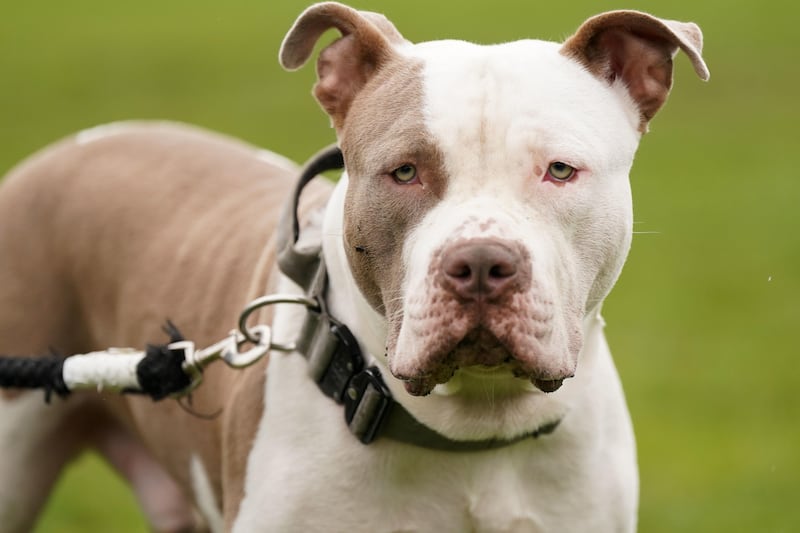A vicious mauling of a young girl on the streets of an English city, and other attacks, has led to the British government announcing a ban on the American XL Bully breed.
But more than three decades after the passing of the Dangerous Dogs Act, with companion legislation in the north, there is ample evidence banning a breed does not work, according to veterinarians, leading animal welfare organisations and local representatives.
The American XL Bully dog will be banned by the end of the year following a series of attacks, Prime Minister Rishi Sunak said on Friday.
It will not automatically apply here and DAERA said it has "no significant body of evidence" to warrant a review of the dangerous dogs legislation.
But the six organisation Dog Control Coalition, whch includes the British Veterinary Association and the RSPCA, said a ban “would not effectively protect the public”.
The act focuses on banning four specific breeds, including most notably the pit bull terrier. Dog attacks have continued and increased, the coalition said, revealing “how ineffective this approach is”.
Read more
- Man arrested after 11-year-old injured in attack by American bully XL dog
- Mother of boy killed by Bully XL dog slams Government over lack of breed ban
Patrick Brown, South Down MLA and the Alliance Party’s animal welfare spokesperson, echoes this view, arguing: “My own view is it is about the breeder, the owner, rather than the breed. I do not think we should be banning particular breeds.”

It is also argued there is potential danger as other breeds emerge and people are lulled into thinking all other dogs are safe when their behaviour often centres on how they are raised.
The American XL Bully, which carried out the widely circulated attack on 11-year-old Ana Paun in Birmingham, has been linked to an increase in attacks, including fatal ones, in Britain.
First emerging in the late 1980s in the United States, it’s “parent breed” is the American pit bull terrier, which was then cross bred with other types, bull terriers.
Steven Cull from Banbridge almost died following an attack by a type of bully breed in his home town last October.
Both his arms and both legs were severely mangled, his surgeon Alastair Brown told the BBC. The 48-year-old’s legs were saved but he lost an arm.

"The dog was circling me and even trying to stretch its mouth over my head at one stage," he said, describing the animal as an "XXL bully mixed with a mastiff".
Two pieces of legislation cover dog control in the north, the Dog Order 1983 and the Dangerous Dogs Order 1991.
Under the laws, councils are the lead agencies when dealing with dog attacks and the policing of banned breeds.
From 2007 to March this year, the councils considered prosecution in 1425 cases of dog at-tacks, including 764 on persons. There were 85 successful prosecutions for attacks on per-sons, with fines of just over £33,000 handed down.
There was no increase in the number of prosecutions considered between 20172018 and last year, approximately 130. However, these numbers do not include all attacks, with Belfast City Council reporting some 1,000 over a five-year period.
Under the 1991 legislation, councils are also obliged to investigate reports of banned breeds. Over that same period, council officers investigated 284 cases but only 29 were identified as a near pure bred, the vast majority if not all pit bulls.
Mr Brown has promised will make reform of policy around the welfare, breeding and raising of dogs a priority in any future assembly.
“Ban a particular breed and they will develop another,” said the Alliance MLA. “We need to restrict some from owning dogs and tackle unethical and unregulated breeding.”
The 2011 Welfare of Animals Act is somewhat linked as it includes provisions around fighting dogs but none to tackle the closely linked breeding of particular aggressive types of canine. There is no robust legislation in connection with breeding, said Mr Brown.
“The increased popularity of American XL bullies has made them valuable commodities, resulting in irresponsible breeding, rearing and ownership," the GB-based Dog Control Coalition said.
"However, the solution to the concerning number of dog bite incidents and fatalities is not to ban this or any other breed of dog because a ban would not effectively protect the public.
"Instead, the government needs to focus on the improvement and enforcement of current breeding and dog control regulations, and on promoting responsible dog ownership and training.”
DAERA, which has cut its contribution to animal welfare from £125m to zero this financial year, noted the banned breeds here - Pit Bull terrier; Japanese Tosa; Dogo Argentino; and Fila Braiziliero - mirrors the position in GB.

“However, it is important to stress that the Dogs (Northern Ireland) Order 1983 places a responsibility on all dog owners to ensure its behaviour does not pose a danger to the public," a spokesperson said.
"Council dog wardens enforce this legislation and have a range of enforcement options should an offence be committed.
“The Department has yet to be provided with a significant body of evidence to warrant a review of dangerous dogs legislation. We will continue to keep the position under review and would discuss the priority to such work upon the return of ministers.”








